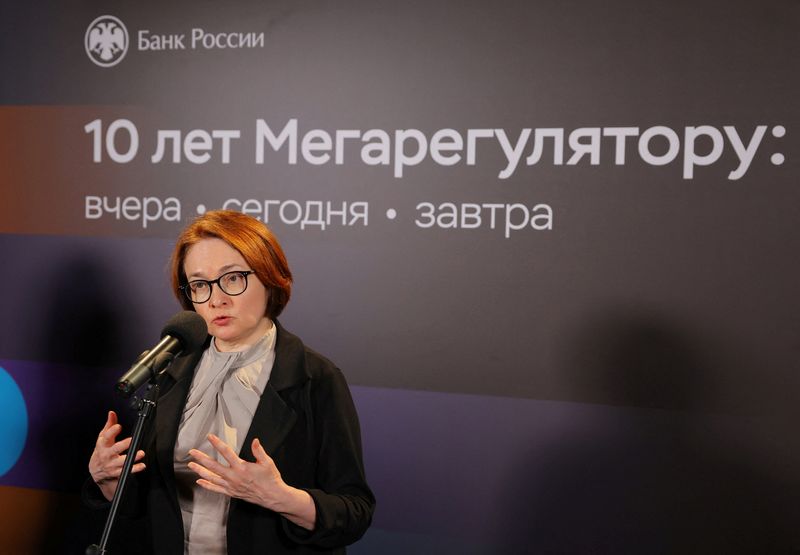MOSCOW (Reuters) - Russian central bank governor Elvira Nabiullina and her deputy Alexei Zabotkin gave a news conference on Friday after the central bank raised its key rate to 13% from 12%.
NABIULLINA ON RATE DECISION
"We raised the rate due to the appearance of inflation risks and will keep it at high levels for quite a long time, until we are convinced of the sustainable nature of the inflation slowdown."
NABIULLINA ON INFLUENCE OF ROUBLE WEAKENING ON INFLATION:
"According to our estimates, a 10% weakening of the exchange rate adds 0.5-0.6 percentage points to inflation. The speed and scale of this effect depend on many factors. For us, the factor accelerating the effect now is the excessively rapid growth of domestic demand, this also creates the preconditions for the accelerated transfer of the weakening exchange rate into prices."
NABIULLINA ON ROUBLE WEAKENING:
“The weakening of the exchange rate is influenced by many factors, exports and imports. In our opinion, it is precisely this increased domestic demand that is overheated and places greater rouble demand for imports. And this also leads to a weakening of the exchange rate.
As for the psychological border of the rouble, there is no such psychological border; our exchange rate is floating. But, of course, we take into account that the weakening of the exchange rate is a pro-inflationary factor. And when we raised the key rate, we reacted to the strengthening of inflationary factors, among which the exchange rate played a significant role, but not only the exchange rate, but also faster lending, and so on.”
NABIULLINA ON RATE DECISION OPTIONS:
“Today we discussed three options - to maintain the rate and look at all the lags... increasing the rate by different amounts - 13% and higher ... there have been major changes in terms of exchange rate dynamics and lending growth rates, which are much higher than what we predicted, and this shows that we need a higher key rate trajectory in order to achieve 4% inflation by the end of next year".
NABIULLINA ON INFLUENCE OF CAPITAL OUTFLOW ON THE RATE:
"To what extent was capital outflow a factor influencing the weakening of the exchange rate? Indeed, this is one of the factors, but in our opinion, not the most significant. Moreover, capital outflow this year was much less than last year ... For 8 months of this year it was $28.6 billion, and last year it was $195.1 billion. And similarly, the acquisition of net foreign assets is also less this year. This affects the exchange rate, but of course the influence is much less than other factors."
NABIULLINA ON POSSIBLE CURRENCY CONTROLS
"The discussion on currency restrictions is currently under way. In many respects, it is the government’s decision. I will talk about the position of the Central Bank. If there is a need to influence capital flows that affect the exchange rate, then it is better to do this through economic rather than administrative measures. In my opinion, administrative measures should really be limited to mirroring reactive measures. What does “economic measures” mean? It means increasing the attractiveness of rouble savings, creating incentives for companies to sell proceeds to pay for current expenses ... and not taking out excess loans instead.
Last year, at the peak of the crisis, we indeed introduced numerous measures that could have produced some results, I mean here currency control measures, but we introduced them together with other measures. And our analysis shows that the main result was associated with a prompt monetary policy reaction, a sharp rise in interest rates, and then this was supported by import-export dynamics.
It is necessary to understand that administrative restrictions, if they are effective..., then they are usually effective only for a limited time. The longer they last, the less effective they are, the more costly they are. Remember the experience of the late 1990s and early 2000s. And now, even more so, we live in a situation where companies are forced to build various complex chains of foreign economic activity and payments, these chains actually allow us to bypass restrictions. But at the same time, these boundaries can create difficulties and obstacles for conducting foreign economic activities, for purchasing necessary goods, services, and components. We see this trend.
If we try to close more and more loopholes, for example, limiting transfers abroad, then these ineffective restrictions will snowball. We close one thing, then business will find a new way round. In the end, it will mean administrative costs and inefficiency for business."
NABIULLINA ON POTENTIAL LIMITS ON ROUBLE WITHDRAWALS

"In my view, this measure will not work, and will not be effective".
"(Restrictions on) transferring roubles abroad are similar to previous measures. Transferring funds to a foreign bank does not in itself create demand for currency. Demand arises at the moment when this currency is purchased. Demand can only be influenced by increasing the attractiveness of the rouble as a store of value. And by the way, it doesn’t matter for the exchange rate whether roubles are converted from a Russian account or a foreign one.”